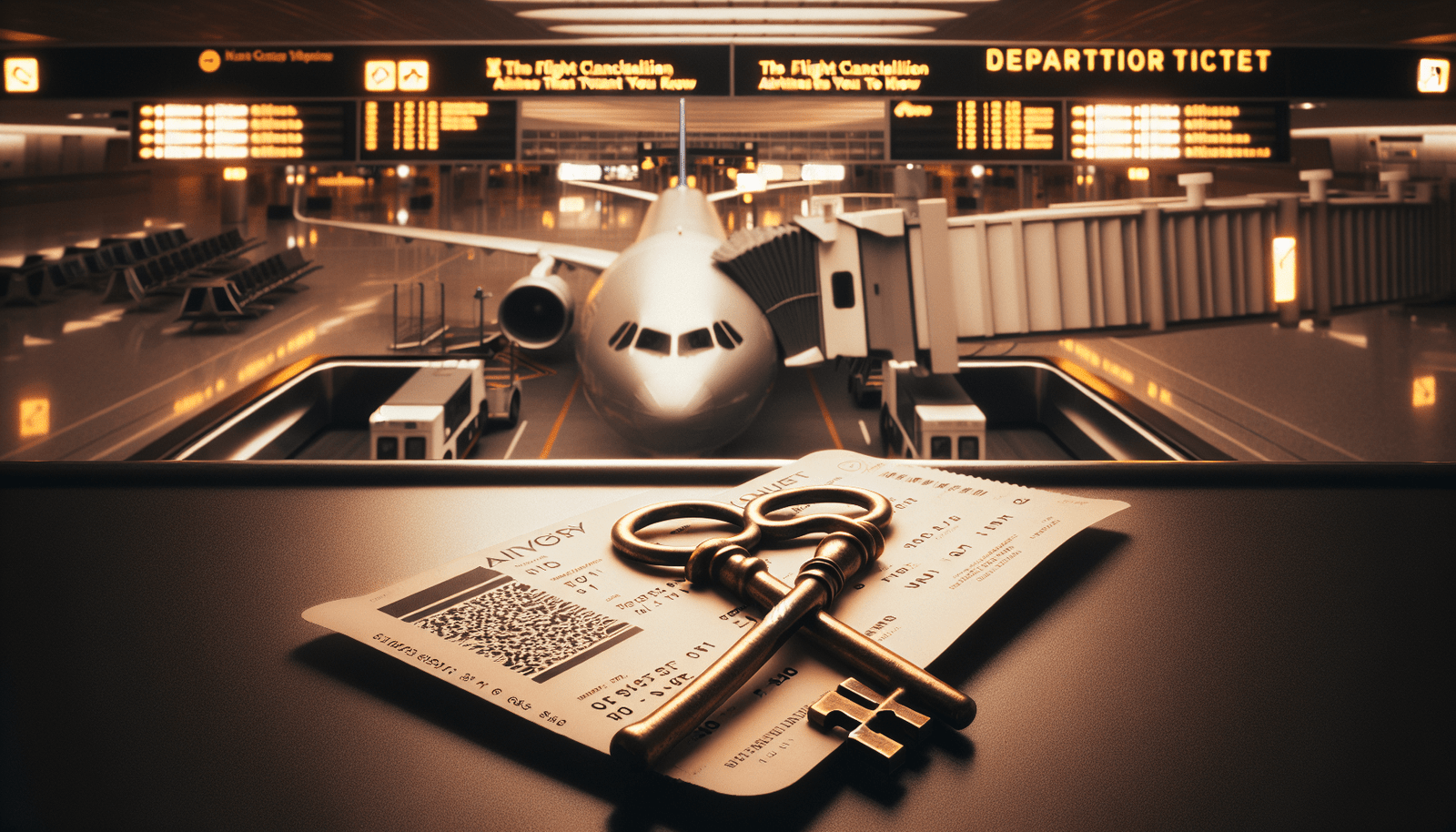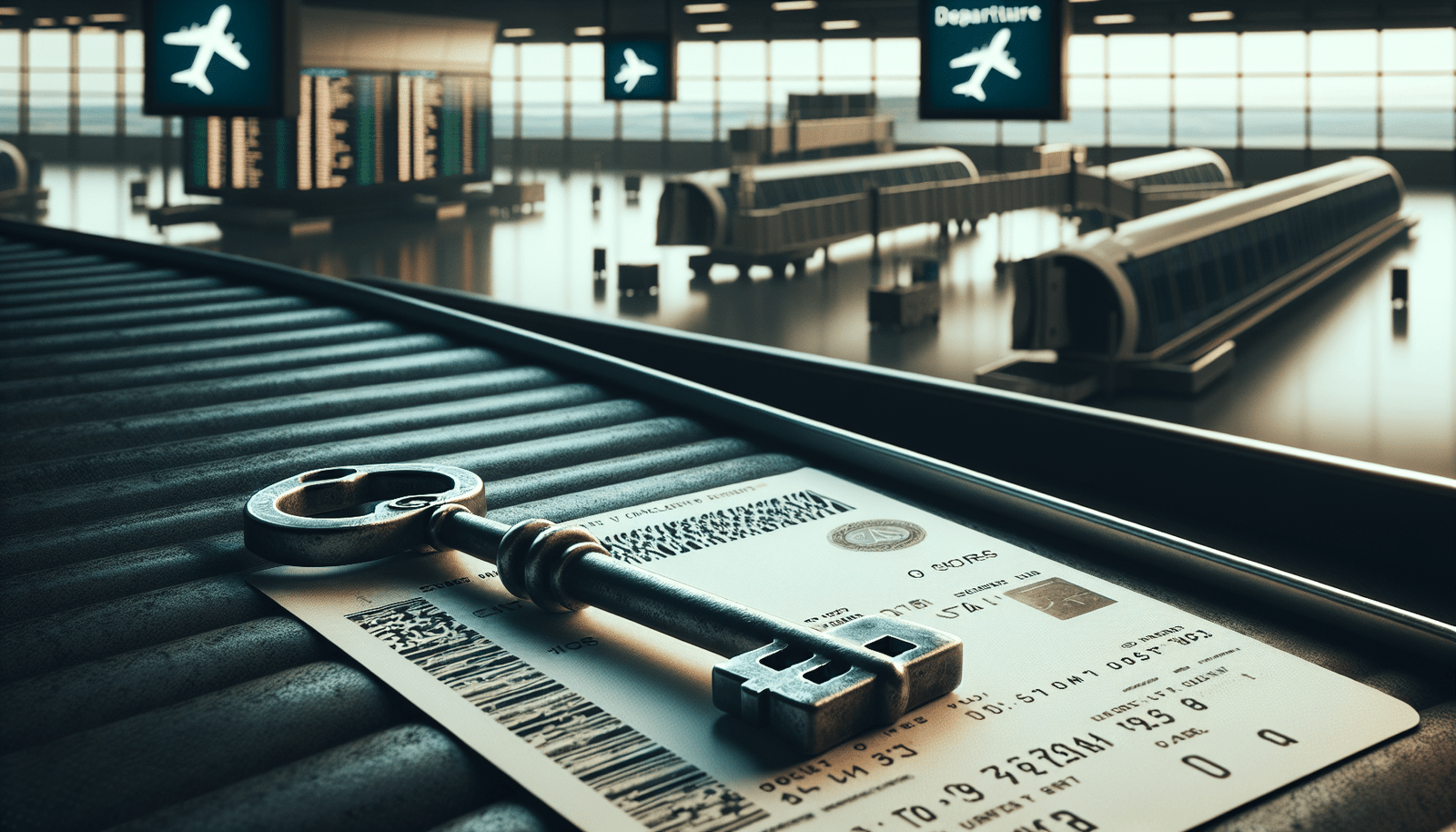When your travel plans hit turbulence with a canceled flight, it can feel like you’re stuck in a storm without an umbrella. Understanding the ins and outs of your rights as a passenger can transform this chaos into a manageable situation. This guide will unravel the key steps you need to take, whether you’re scurrying to rebook or determined to get a full refund. With the latest updates from the US Department of Transportation, there are more options than ever to ensure you’re not stuck with an unwanted travel nightmare.
Moreover, for those flying across the pond, European regulations offer their own set of protections, allowing you to claim compensation for disruptions. If you’re quick about it, using airline apps can be a game-changer, enabling faster rebooking and less time spent in long customer service queues. Choose alternative airlines as a backup if necessary, and remember, keeping detailed documentation of your journey mishaps can significantly help with claiming compensation later. So next time you’re faced with a delay or cancellation, take comfort in knowing that you have multiple routes to ensure your trip still goes smoothly.

This image is property of i.ytimg.com.
Understanding Flight Cancellations
What constitutes a flight cancellation
When you hear the term “flight cancellation,” it might sound straightforward, but there’s often confusion about what it exactly means. A flight cancellation occurs when an airline decides not to operate a flight that was previously scheduled and for which tickets have been sold. This can happen at any time before the scheduled departure, and it affects all passengers booked on the flight. It’s essential to understand that this is different from a delay, where the flight is postponed, but will still occur at a later time.
Common reasons airlines cancel flights
Airlines don’t make the decision to cancel flights lightly, as these decisions impact their operations and customer satisfaction. Common reasons for cancellations include weather conditions, such as snowstorms or hurricanes, which make flying unsafe. Technical issues with aircraft can also cause cancellations if a plane is deemed unfit to fly. Additionally, operational challenges, such as staffing shortages or problems within air traffic control systems, can lead to cancellations. Occasionally, airlines cancel flights due to insufficient bookings, though they are less likely to admit this.
Impact of cancellations on passengers
Flight cancellations can be incredibly disruptive to passengers, affecting both leisure and business travelers. For those on vacation, a cancellation can mean missed days at a destination or a complete disruption of plans. Business travelers might miss critical meetings or events. Cancellations can lead to additional expenses, such as meals, accommodation, or transportation, especially if the issue takes time to resolve. While some airlines provide compensation or assistance, it often requires a proactive approach on your part to understand and insist on your rights.
Airlines’ Secretive Practices
Why airlines keep certain policies under wraps
Airlines maintain a degree of secrecy regarding their policies, often to retain operational flexibility and minimize costs. By not publicizing every detail, they can adjust policies to suit circumstances like demand fluctuations or financial pressures. Keeping certain policies vague allows airlines to reduce the likelihood of facing penalties or customer backlash over specific situations like cancellations and delays.
Hidden fees and charges
Hidden fees are a notorious aspect of air travel. Airlines often advertise low fares but then tack on additional charges for checked baggage, seat selection, and in-flight meals, which can significantly increase the overall cost of your trip. These fees are often not immediately apparent during the booking process, leaving many passengers surprised and frustrated at the airport. It’s crucial to review all potential fees during booking to avoid unexpected expenses.
How airlines benefit from flight cancellations
Despite the chaos cancellations can cause, airlines manage to find some benefits. If a flight is not full, canceling it might be more cost-effective than flying at a loss. Additionally, rerouting passengers through their network on other flights can sometimes mean higher efficiency or even filling up other under-booked flights. In some cases, airlines save costs on crew accommodations and operating expenses of a half-empty plane by canceling and redirecting passengers.
Your Rights as a Passenger
Key regulations from the U.S. Department of Transportation
The U.S. Department of Transportation (DOT) provides several protections for passengers, especially concerning flight cancellations. Under the latest rules, if an airline cancels your flight or makes significant changes, you are entitled to a full cash refund. This applies even to non-refundable tickets if the flight is within, to, or from the U.S. These changes must be automatic and prompt, with refunds processed within specific timeframes: seven business days for card purchases and 20 days for cash and check payments. Airlines are also obligated to refund fees for significantly delayed baggage and services not rendered.
Significant departure and arrival time changes
According to DOT guidelines, a significant change is defined partly by timing. For domestic flights, any adjustment by more than three hours, and for international flights, more than six hours is deemed significant. This definition helps streamline processes when claiming refunds or compensation, ensuring passengers are not left in a lurch due to considerable delays or schedule changes.
The European Union’s EU261 regulation
The EU261 regulation offers robust protections for passengers traveling within or from the EU. If your flight is canceled less than 14 days before departure, you may be entitled to up to €600 in compensation, depending on the distance of the flight. The regulation also covers reimbursement and the duty of care, which includes meals, refreshments, and accommodation when necessary. EU261 can apply even if you are flying on a non-EU airline, as long as the journey starts in the EU, emphasizing Europe’s commitment to passenger rights.
Navigating Refunds
How to secure a prompt cash refund
Securing a cash refund begins with knowing your rights. Under DOT rules, airlines are required to offer refunds back to the original form of payment, including all taxes and fees, without needing to jump through hoops. It’s vital to approach customer service with this knowledge and insist on a cash refund if your flight is canceled or significantly delayed. Document your refund request, referencing relevant regulations to demonstrate your awareness of your rights.
Refunds for additional services like baggage
If you’ve paid for additional services such as checked baggage or seat selection and the service isn’t provided due to cancellation, you’re entitled to a refund for those fees. Airlines are required to process these refunds promptly. Ensure you gather proof of payment and service non-delivery, and submit this information when requesting your refund to streamline the process.
Avoiding the pitfalls of voucher offers
Vouchers can be tempting as they often come with bonus amounts, but they also tie you to future travel with the airline. Before accepting a voucher over a cash refund, consider your travel plans and the airline’s future reliability. Vouchers may come with expiration dates or usage restrictions, so always read the fine print. Opt for cash if there’s any uncertainty about using a voucher within the given timeframe.

Strategies for Quick Rebooking
Using airline apps effectively
Airline apps are invaluable tools for travelers, especially during disruptions. Most apps allow you to rebook canceled flights quickly and provide real-time updates on available options. Before heading to the airport or customer service desk, check your app for rebooking possibilities. Being familiar with the app’s rebooking features before travel can save you valuable time during a cancellation.
Contacting customer service through international numbers
A lesser-known tip for bypassing long wait times is to call an airline’s international customer service numbers. These lines often have English-speaking representatives with shorter queues. While others are waiting on hold with domestic lines, you might find faster help by connecting through international offices. Researching these numbers before your trip can expedite your rebooking process when needed.
Leveraging major carriers for flexibility
Major carriers often provide more flexibility compared to budget airlines, given their extensive networks and partnerships. In the event of a cancellation, they can offer more rebooking options, including partner or alliance flights. Understand your ticket’s terms and conditions regarding rebooking and leverage this flexibility by having alternative flights in mind when contacting customer service.
Maximizing Compensation
Understanding controllable delays
Not all delays warrant compensation; however, if a delay is within the airline’s control (e.g., staffing or maintenance issues), you may be entitled to compensation. Knowing the difference between controllable and uncontrollable delays helps frame your requests for assistance. Always request clear reasons for delays to ascertain your eligibility for compensation and to strengthen any claims you make.
Claiming meal vouchers and hotel accommodations
If a delay or cancellation requires an overnight stay, airlines often provide meal vouchers and hotel accommodations. These are typically for controllable delays, so it’s crucial to document the specifics of your delay and confirm its cause with the airline. Make sure to ask proactively at the customer service desk for these amenities and retain all receipts for your records.
Steps to ensure transportation costs are covered
When stranded due to a cancellation or delay, transportation costs between the airport and accommodation can add up. Before arranging your transport, confirm with the airline if they cover these costs or provide shuttle services. Document all expenses meticulously, retaining receipts and confirmations to support reimbursement requests if these costs are self-incurred.

The Power of Alternative Airlines
How airlines like JetBlue and Alaska Airlines can save your trip
In the event of a cancellation or substantial delay, considering alternative airlines such as JetBlue or Alaska Airlines might save your trip. These carriers can offer competitive rates or convenient flights to your destination, and booking with them may even outshine waiting for a major carrier’s next available flight. Flexibility and speed with alternatives often serve as essential backup plans.
Benefits of choosing alternative airlines
Alternative airlines can offer numerous benefits, including personalized service, fewer hidden fees, and more service-oriented experiences. They often operate in less congested airports, which might lead to fewer delays. Moreover, their loyalty programs can provide extra value if you travel with them frequently.
When to employ a backup plan
Having a backup plan is crucial, especially during seasons of high travel demand or for critical trip connections. Keeping a list of alternative flights or nearby airports enables you to quickly adjust plans if your original flight is canceled. Employ this plan when the current airline offers little flexibility or if compensation options are unsatisfactory.
Preparing for the Worst
Booking accommodations promptly
In the event of an unexpected overnight stay due to flight disruptions, book your accommodation as soon as possible. Rooms tend to fill quickly during mass cancellations, leaving fewer options. Use apps or direct hotel numbers to secure a place promptly, and consider booking with flexible cancellation policies in case your flight situation changes.
Documenting all communications and expenses
Thorough documentation of all interactions with airlines and service providers is crucial during cancellation and delays. Record detailed notes on the reasons provided, actions taken, and the names of airline representatives you interact with. Retain all receipts and emails related to additional expenses incurred, as they form the basis for any refund or compensation claims.
Self-incurred travel costs and seeking compensation
Sometimes, the quickest solution is to incur travel costs yourself, such as covering a direct flight home. When this happens, ensure you save all related receipts and seek compensation from the airline. Promptly file claims with detailed evidence, as airlines may reimburse reasonable costs if claims are supported adequately and align with their policies.
Tools for Claiming Compensation
Websites like AirHelp and ClaimCompass
Websites such as AirHelp and ClaimCompass provide services to assist passengers in claiming compensation for cancellations and delays. They simplify the process of filing claims through expert handling and guidance. These platforms can be beneficial if you’re unfamiliar with aviation law or if an airline is unresponsive.
Fees and services provided by compensation websites
While compensation websites can expedite your claim process, they usually charge a fee—often a percentage of the claim. Before using these services, review their fee structures and evaluate the benefit relative to managing the claim independently. Some sites offer no-won, no-fee services, providing peace of mind when engaging these platforms.
Guidelines for using these platforms effectively
To make the most out of compensation websites, ensure you have all your documentation ready, including flight details, communications, and receipts. Understanding their requirements and policies beforehand speeds up your claim processing. It’s also advisable to compare multiple platforms to decide which one offers the best service and fees for your needs.
Conclusion
The importance of knowing your rights
Understanding your passenger rights is crucial in managing disruptions effectively and ensuring that airlines fulfill their obligations. Whether through cash refunds, rebooking, or compensations, knowing your options allows you to make informed decisions swiftly.
Being proactive and prepared for flight disruptions
Preparedness is critical in facing travel interruptions with minimum hassle. Utilizing airline apps, gathering information, and having backup plans are strategies that enable quick adaptation to changes. Being proactive mitigates stress and can significantly enhance your travel experience.
Using strategic choices for stress-free travel
Strategic planning, such as using compensation tools, choosing flexible airlines, and retaining detailed records, ensures your travel remains as smooth as possible despite any disruptions. By employing these strategies, you gain confidence and peace of mind while navigating the complexities of air travel.
Some of the links on this site are affiliate links, which means I may earn a small commission if you click on them and make a purchase, at no additional cost to you. As an Amazon Associate, I earn from qualifying purchases.

